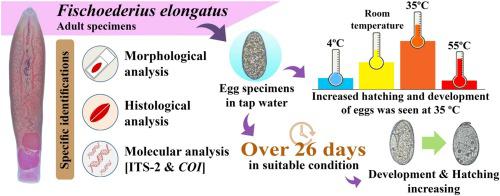Veterinary Parasitology ( IF 2.0 ) Pub Date : 2020-05-16 , DOI: 10.1016/j.vetpar.2020.109135 Sirapat Nak-On 1 , Thapana Chontananarth 2

|
Various temperatures may have different effects on the distribution of paramphistomes that cause amphistomosis in cattle, including Fischoederius elongatus. Therefore, this study aimed to investigate the effects of different temperature treatments on F. elongatus hatching, with specific identification using morphological, histological, and phylogenetic analysis. All specimens were collected from two buffalo (Bubalus bubalis) rumens in a slaughterhouse in Pathum Thani province, Thailand. F. elongatus adults were kept in phosphate buffered saline solution for egg collection. The egg specimens were incubated in tap water under four different temperature conditions: 4 °C, room temperature, 35 °C, and 55 °C. For 31 days, egg specimens of approximately 50 eggs per observation were randomly classified into three stages (undeveloped, developing (or pre-hatching), and hatched). To test the change of temperature, cold water was used for thermal shocking the egg specimens. The results indicated that rates of egg development and hatching were highest at 35 °C and significantly higher than in the other treatments (P < 0.001). In addition, statistical investigation of pre-thermal shock results also suggesting that 35 ºC may be a suitable condition for hatching F. elongatus eggs and could enhance the developing and hatching by longer periods of incubation for more than 26 days. Even changing the temperature could affect development and hatching but initial environment temperature remains an important factor. These data could be used for efficient epidemiological prediction of F. elongatus and applied in livestock management.
中文翻译:

瘤胃吸虫(Fischoederius elongatus)(Trematoda:天蛾科):对卵孵化的适宜条件的初步调查。
各种温度可能对导致牛(包括长形菲氏鱼)血吸虫病的淋巴组的分布有不同的影响。因此,本研究旨在通过形态,组织学和系统发育分析来特异性鉴定,以研究不同温度处理对延长线虫孵化的影响。所有标本均从泰国巴吞他尼省的一家屠宰场的两个水牛(Bubalus bubalis)瘤胃中收集。伸长F.将成年人保持在磷酸盐缓冲盐溶液中收集卵。鸡蛋标本在四种不同温度条件下于自来水中孵育:4°C,室温,35°C和55°C。在31天中,每次观察大约50个卵的卵标本被随机分为三个阶段(未发育,发育(或孵化前)和孵化)。为了测试温度的变化,使用冷水对蛋标本进行热冲击。结果表明,卵的发育和孵化率在35°C时最高,并且显着高于其他处理(P <0.001)。此外,对热前震荡结果的统计调查还表明,35ºC可能是孵化长形拟南芥的合适条件。卵,可以通过长时间孵化超过26天来增强发育和孵化率。即使改变温度也会影响发育和孵化,但是初始环境温度仍然是重要因素。这些数据可用于有效地对F. elongatus进行流行病学预测,并用于牲畜管理。











































 京公网安备 11010802027423号
京公网安备 11010802027423号